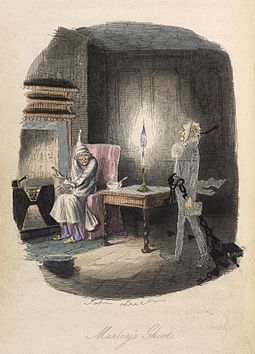Charles Dickens’ novella A Christmas Carol was first published on December 19, 1843, and it has been a much beloved classic ever since. Sure, it has some Protestant undertones – why was Scrooge, presumably predestined, given the gift of the ghostly visits, but not his less fortunate and presumably reprobated associate, Jacob Marley? It is a Catholic truth that every soul is offered sufficient grace to go to heaven, if they co-operate with said grace.
A quibble, perhaps, for I do love the very Catholic theme that it’s never too late to accept the grace of God. As Saint Augustine, having – in his eyes – wasted much of his life, cried, Late have a loved Thee, O Beauty ever ancient and ever new! Our lives, of course, are never ‘wasted’, for God makes all things new, and can turn any life into heavenly gold, even at the last minute, gasping our last – the divine promise made to Saint Dismas, who may have been the first person to enter paradise, teaches us so.
We’re not sure how old Ebeneezer was when he accepted the grace of God, never looking back, becoming the generous, joyful, cheerful lover of all things ‘Christmas’ God had always intended him to be, and would be in heaven, in saecula saeculorum.
So, on that hopeful note, here is an audio version of Dickens’ book that I discovered a few years ago, and oft listen to, on Christmas Eve, or the days prior, as a sort of preparation, or perhaps in the days afterward. For now, to more cheerful matters – here are the five ‘staves’ of the Carol – and listen at your pleasure, as you do housework, or baking, or wrapping, or just sitting before your own hearth, with a warm cup, pondering that His yoke is indeed easy, and His burden light. And a very Merry Christmas to one and all! +









